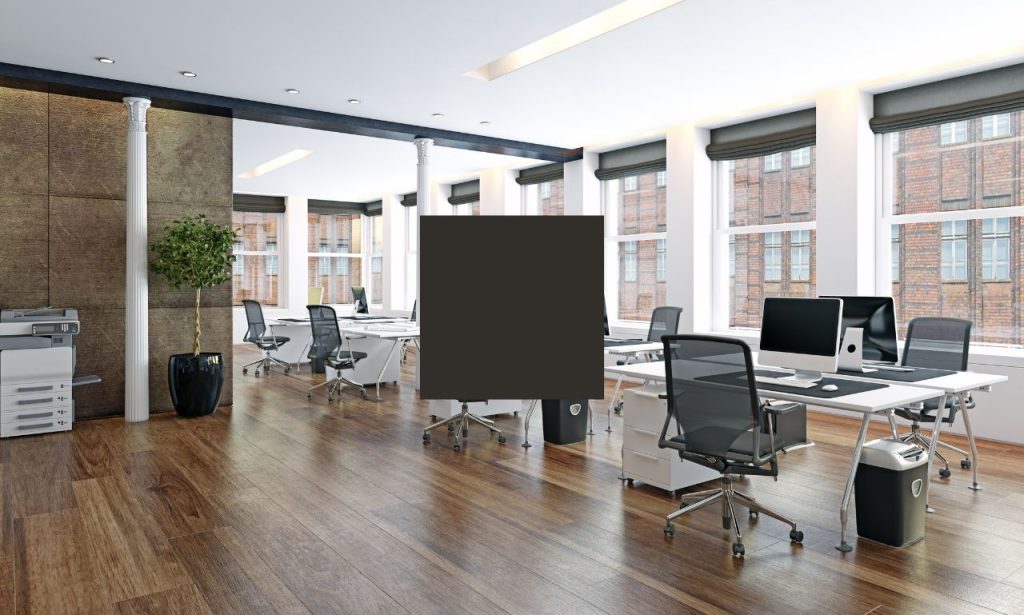Picture this: an office tailored perfectly to your business, without the hassle of a long-term commitment. Welcome to the world of managed office spaces—the modern, flexible office solution you’ve been searching for. Managed office spaces bring together the best of flexibility, convenience, and personalization, offering a unique solution for businesses of all sizes. Let’s dive deeper into what makes managed offices distinct and how they compare to other popular office solutions.
Definition of a Managed Office
A managed office is a flexible workspace solution where the office provider takes care of everything, from the fit-out to ongoing management. Think of it as a “blank canvas” that you can customize to suit your exact needs, while someone else manages the upkeep. It offers a middle ground between a traditional office lease and a serviced office, blending flexibility with personalization. Managed office spaces are often preferred by companies that require tailor-made solutions without the headaches of a long-term lease commitment.
Distinguishing Features of Managed Offices

Managed offices offer a blend of flexibility and personalization, making them different from conventional leased office spaces. Here’s what sets them apart:
- Flexible Lease Terms: Managed offices often come with flexible lease terms, typically ranging from 1 to 3 years. Unlike traditional lease contracts that can stretch for decades, these office agreements offer more agility. The flexibility allows businesses to adjust their office needs as they grow or change directions, making it an ideal office solution for companies in dynamic industries.
- Customizable Space: Unlike a serviced office where everything is predefined, a managed office gives you the freedom to design the workspace, from layout to décor, creating your ideal workspace. Whether you want open-plan desks, private office spaces, or dedicated meeting areas, managed offices let you craft a workspace that truly reflects your brand identity.
- End-to-End Management: The office provider takes care of the fit-out, furniture, maintenance, and other day-to-day management aspects. It’s a turnkey office solution without the headache of dealing with hidden costs or major maintenance requirements. This enables you to focus on your core business without getting bogged down by administrative tasks.
- Tailored Amenities: Whether you need dedicated meeting rooms, bespoke design, or a concierge service, a managed office space can be tailored to your specific business requirements. You have access to a wide range of additional amenities to support your team’s productivity and well-being, ensuring a perfect office space for your needs.
Typical Services Offered in Managed Office Spaces
- Furnishings and Fit-Out: Fully-furnished workspaces tailored to your preferences. You can choose the layout, furniture, and even decor that suits your brand image and team culture.
- Facilities Management: Cleaning, lighting, heating, and maintenance are managed for you. The office provider ensures that the office remains in prime condition, saving you time and resources.
- Utilities Included: Utility costs like electricity, water, and Wi-Fi are often included in the monthly price. This all-inclusive cost structure makes budgeting easier and ensures there are no surprises.
- Professional Amenities: Access to amenities like meeting rooms, breakout spaces, and event spaces. Managed offices offer dedicated meeting rooms, private breakout areas for brainstorming sessions, and event spaces for hosting clients or team-building activities.
- Support Services: Concierge services and in-house teams to assist with daily office needs. This can include reception services, postal handling, and administrative support to help your office run smoothly.
Advantages of Managed Offices
Flexibility in Lease Agreements
Managed office spaces offer a shorter lease term compared to traditional offices, ranging from one year to three years. This allows businesses to pivot quickly if their needs change. The flexibility of these lease agreements makes them perfect for companies seeking agility without a long-term commitment. Whether you’re expanding rapidly or navigating market uncertainty, managed offices allow you to adapt your workspace as your business evolves.
Tailored Amenities and Support Services
Managed offices provide customizable amenities to create the perfect workspace for your team. From executive suites to project team spaces, everything can be designed to suit your specific needs—including in-built meeting areas and breakout spaces for team members. You get a bespoke space without having to worry about hidden costs. For example, you can create collaborative zones for teamwork, soundproof rooms for calls, or comfortable lounges for informal discussions. The amenities are designed around your business culture and operational requirements.
Enhanced Networking Opportunities
Though they are private office spaces, managed offices are often housed within larger office buildings or business centers that have coworking areas and shared facilities. This environment allows you to network with other professionals, giving your business culture an opportunity to grow within a diverse community. Networking opportunities arise through shared common areas, building events, and interactions with neighboring companies, which can lead to potential collaborations or partnerships.
Disadvantages of Managed Offices
Potentially Higher Costs Compared to Leased Offices
Managed offices can be more expensive than leasing traditional offices due to the flexibility and the services included. While these offices come with all-inclusive pricing, the convenience of having everything managed may come at a premium on rent. However, this premium often covers the upfront costs and removes the burden of maintaining the workspace. Businesses need to weigh the benefits of flexibility and included services against the potentially higher monthly cost.
Limited Control Over Office Customization
Although you get some customization options, managed office providers might have certain restrictions on what you can and cannot modify. You may not have the same level of control as you would in a leased office, where you manage every aspect of the space. For example, structural changes or extensive renovations may not be possible due to building regulations or shared management policies. This limitation might be a drawback for businesses that require very specific customization or branding elements.
Characteristics of Serviced Offices
Serviced offices are all-inclusive office spaces where businesses rent fully furnished, ready-to-use offices with short-term flexibility. Serviced offices are popular for companies seeking a quick setup and a simple, hassle-free workspace solution. Here are the key aspects:
Common Features of Serviced Offices
- Fully Furnished: Ready-to-move-in office solutions with basic amenities already set up. Everything from desks, chairs, to printers is provided, making the transition seamless.
- Short Lease Duration: Lease options range from monthly to yearly, perfect for businesses needing short-term space. Companies can scale their footprint up or down depending on their operational requirements.
- Support Staff Included: Reception, administrative support, and cleaning services are typically part of the package. This provides a professional image without having to hire additional support staff.
- All-Inclusive Pricing: Utilities, furniture, and additional amenities are included in one monthly payment, making it easier to manage office costs. The all-inclusive cost is attractive to many small businesses and startups that need to budget carefully.
Benefits of Choosing a Serviced Office
- Fast Setup: Get started immediately without worrying about setup time or fit-out costs. The office is ready from day one, allowing you to focus on your core business activities.
- Scalability: Expand your office footprint quickly, whether you need desks for team members or an additional space for company expansion. This makes serviced offices ideal for growing businesses that may need to add more space on short notice.
- Access to Amenities: Meeting spaces, breakout areas, and other facilities are included without additional service costs. You have everything you need under one roof without having to manage logistics or maintenance.
Comparing Managed Offices and Serviced Offices
Key Differences in Lease Duration
- Managed Offices: Lease terms for managed offices generally range from 1 to 3 years, offering medium-term flexibility. Managed offices are better suited for companies that have outgrown coworking environments but do not want to commit to a conventional lease.
- Serviced Offices: Lease duration for serviced offices is shorter, often on a monthly or quarterly basis, making them ideal for companies needing operational flexibility. This option is perfect for startups or businesses requiring temporary space during expansion.
Staff Support and Amenities Available
- Managed Offices: Amenities and services are tailored to your requirements, and you can bring in your own dedicated account team. If you need specific support services, you have the flexibility to source your preferred providers.
- Serviced Offices: Staff support like reception and cleaning is already provided, which means less hassle but also less flexibility in choosing your service options. The support is standardized, making it easy but not necessarily customizable.
Target Audience for Each Office Type
- Managed Offices: Best for mid-sized businesses or growing companies looking for a customizable workspace without the burden of traditional leasing arrangements. They are also suitable for businesses needing privacy, especially those that handle sensitive data.
- Serviced Offices: Ideal for startups, satellite offices, or small businesses looking for minimal commitment and a turnkey workspace. They are perfect for teams that need flexibility to move locations or adjust space requirements as the business changes.
Understanding Leased Offices
Definition and Features of Leased Offices
A leased office is a traditional office space rented out by a landlord for a long-term period, usually between 5 to 10 years. The tenant is responsible for the fit-out, furniture, and ongoing maintenance, which offers more control but comes with higher upfront CAPEX. This type of office agreement provides a stable workspace where the business has complete control over the design and management of the space.
Cost Implications and Long-Term Commitments
- Upfront Costs: Leased offices involve initial costs like fit-out costs and deposits, making them more capital-intensive. There are also additional expenses like agency lease-purchase payments, lighting design, and other fit-out-related requirements.
- Long-Term Lease: A typical lease period is longer, providing stability but less flexibility for companies whose needs may change. The long-term arrangement can be an advantage for established companies that are confident in their office space needs.
- Service Charges: Operating expenses such as utilities, maintenance, and service charges are separate from rent and are managed by the tenant. The tenant has to account for these costs in their annual operating budget.
Comparing Managed Offices and Leased Offices
Flexibility vs Stability
- Managed Offices: Provide flexibility with shorter leases and fewer upfront costs, making them a flexible solution for growing businesses. This type of office allows you to expand or downsize without being tied into a long-term agreement.
- Leased Offices: Offer stability with a long-term arrangement, suitable for established businesses that want to maintain control over their workspace. Leased offices provide more control over workspace personalization and are ideal for companies with stable growth projections.
Setup Time and Maintenance Considerations
- Managed Offices: Ready-to-use with minimal setup time, managed by the office provider. The office management team handles maintenance requirements, reducing the burden on the tenant.
- Leased Offices: Require setup time and ongoing maintenance, which may include working with third-party suppliers and managing basic operating requirements. While this offers complete control, it also demands more time and effort from the tenant.
Suitability for Various Business Sizes
- Managed Offices: Suitable for mid-sized companies and expanding businesses needing a private space with flexibility. Managed offices work well for those looking for customizable options without the responsibilities that come with a traditional lease.
- Leased Offices: More appropriate for larger, well-established companies with specific workspace personalization needs. Leasing office space is best for businesses that want complete control over their real estate strategy and are prepared for the long-term commitment.
Exploring Co-working Spaces

Definition and Characteristics of Co-working Spaces
Coworking spaces are shared work environments where individuals or companies rent desks or private offices on flexible terms. These spaces provide a collaborative atmosphere with shared facilities and networking opportunities. Coworking spaces are popular among freelancers, startups, and small businesses looking for flexible workspaces without the burden of long-term office contracts.
Key Benefits of Co-working Environments
- Community: Access to a diverse community of entrepreneurs, freelancers, and other businesses. This type of environment encourages collaboration, exchange of ideas, and potential business partnerships.
- Affordability: Flexible lease terms with an all-inclusive cost structure, reducing upfront CAPEX and other hidden costs. Membership plans make it easy to budget, with no surprise expenses.
- Amenities: Access to meeting rooms, event spaces, and other amenities without the extra hassle of managing them. You get the benefit of professional facilities without needing to maintain them, making coworking spaces a popular solution for businesses that need agility.
Differences Between Managed Offices and Co-working Spaces
Privacy and Dedicated Space Considerations
- Managed Offices: Provide a private, dedicated space for your team, offering more privacy and control compared to a coworking environment. Managed offices are suitable for teams that need a separate workspace away from the distractions of shared areas.
- Coworking Spaces: Offer less privacy as they typically involve shared spaces and communal areas, although private workspace options may be available at a premium. The collaborative nature of coworking environments means they are less suited for companies that handle sensitive information or need exclusive meeting spaces.
Whether you need a tailored office space for your growing team or a flexible solution for short-term projects, managed offices offer the perfect balance of personalization and convenience. Ready to explore the ideal workspace for your business? Contact us today and let us help you find your next managed office!
ALSO READ: What Are Good Businesses to Start in Florida?
FAQs
Managed offices are ideal for mid-sized businesses or those experiencing growth and needing flexible, personalized workspaces.
Managed office lease terms usually range from one to three years, offering more flexibility compared to traditional office leases.
Yes, managed offices offer customization options, allowing you to create a workspace that fits your brand identity.
Managed offices offer flexible leases with end-to-end management, while leased offices require a longer-term commitment and more hands-on management.




